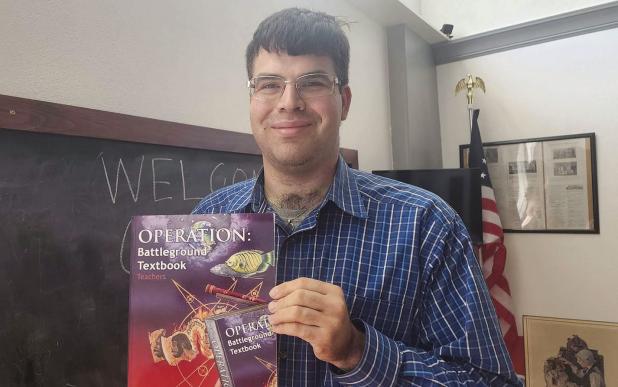
Local author touts science book at school board
Local author Zachary Schertz has penned a science manual for teachers that contests some aspects of Charles Darwin’s theory of evolution, and he offered it to the Olney Independent School District’s board of trustees at a recent meeting. Mr. Schertz, 31, grew up in College Station and earned his bachelor’s degree in religious and theological studies from St. Edward’s University in Austin. He works at Stewarts Food Store in Olney, and has written several drafts of his textbook, “Operation: Battleground,” which is available on Amazon.com. The OISD trustees said they would consider his suggestion that “Operation: Battleground” be used to supplement lessons about Darwin’s theory. The Enterprise caught up with Mr. Schertz to get more details about “Operation: Battleground” and his other works.
Q: What was the attraction of religious and theological studies? A: I just wanted to know more about my creator and just learn what I can do to best serve Him. And the best thing I can do is by preaching His word to others. But when you want to teach things to other people, it’s best to have a bit of knowledge under your belt.
Q: I understand this is not the first time that you’ve talked to the school trustees about using your textbook as a supplementary text. What were you asking them to do?
A: I want them to be able to not only use this book to supplement. There’s a lot of good science in the textbook. I read it personally - the textbook that OISD uses. There’s all sorts of really good science, but there’s a bunch of unscientific evolution in it. When they get to the section on embryologic development or the section on Darwin’s finches … some of these things are inaccurate.
Q: What is in your book that contradicts what’s in the textbook?
A: When Charles Darwin traveled to the Galapagos Islands, he didn’t even go as a scientist. He was studying to be a pastor but he couldn’t get a job anywhere, so he was an unpaid captain’s companion. And when he went to the Galapagos island, he looked at all these finches’ beaks and said, ‘Wow, these beaks are amazing. Each one of these has a slightly different beak for what it’s trying to eat. From this, I’m going to conclude that every single animal and plant and the entirety of earth is related. That’s a bit of a stretch, Charlie, quite a bit of a stretch. All you can really know from that is that these finches have slightly different- shaped beaks, and you see that in every organism across the planet. There are incredible similarities, but that does not prove that all animals and all plants share a common ancestor. That’s just a huge stretch of logic. That’s unscientific.
Q: So what do you say in yourbook? What, how should it be taught?
A: The way I look at it, these finches have slightly different beak shapes because they have slightly different diets and slightly different environments. All we know is that they have slightly different beaks. Just leave origins out of it and not say, ‘This evolved from a common ancestor so many millions of years ago.’ Let’s just say these finches have slightly different beaks because this is what they eat. That is the extent of our scientific knowledge.
Q: So what you are advocating maybe is the willingness to not know.
A: Yes. Because one of the best parts about science is that we do not know. Scientists are still trying to figure out what light is. We’ve measured it. We can refract it, bend it. We’ve even found a way to speed it up, slow it down and come bring it to a complete stop. But we still don’t exactly know what it is.
